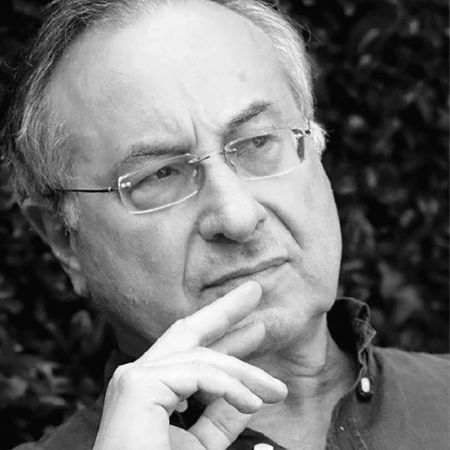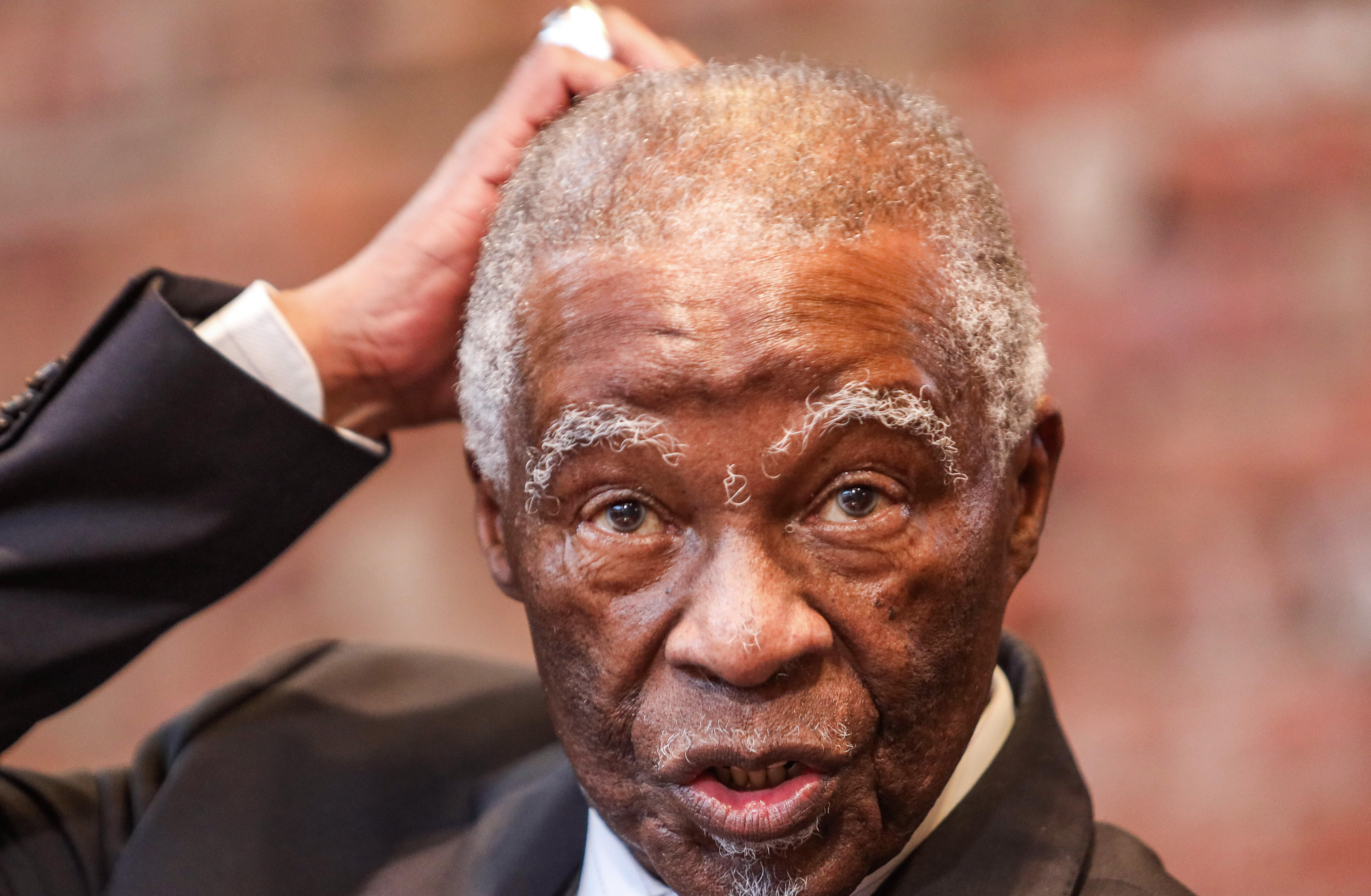Former president Thabo Mbeki’s foundation has accused National Dialogue organisers, including staff in the Presidency, of risking abuse of government funds and speculated that their objective was to take over the dialogue and “collapse” it.
Foundation CEO Max Boqwana explained how relations between the foundation and the government broke down at a Thabo Mbeki African School of Public and International Affairs event in Tshwane on 12 September.
Vincent Magwenya, the President’s spokesperson, has vehemently denied Boqwana’s allegations.
“That’s absolute rubbish,” he told Daily Maverick. “He has no evidence to prove any of his claims. This is nothing but slander. Max has no shred of evidence to substantiate his claims.”
At the direction of Mbeki, who sat on the stage as he spoke, Boqwana said the foundation had earlier defended the organisers against accusations of likely financial abuse.
Boqwana then listed the reasons that the foundation withdrew from the first National Dialogue Convention on 15 August.
“I know how you comrades behave,” Boqwana said he was warned by a trade union leader before the foundation withdrew. “You have interesting methodologies of skimming money from the government. One way is self-created emergencies so that you can get money quickly but you don’t have to plan, a transparent process of how to spend it. It gives you an opportunity to do all manner of things with that money.”
Boqwana said at the time he disputed this, but “five days later, we were asked to do exactly what we were accused of”.
That’s when the foundation had decided to withdraw from the convention.
/file/dailymaverick/wp-content/uploads/2025/09/0000270612.jpeg)
“We had been working on this for 13 months,” Boqwana said. “They arrived three weeks before August 15 and said they were going to drive the process. They said they would be ready in eight days. In the meeting one of them looked at his phone and said ‘R28-million has just come in’.
“We said this is exactly what we’re being accused of. We do not want to be close to a process like that.
“They said they’re ready, but we said [that] as foundations, we had a responsibility to protect the credibility and legitimacy of this process. Why? Because it may be the only thing that saves this country from the abyss,” he said, adding that the way the convention organising committee proceeded “you would think their objective is to collapse it”.
Boqwana said he did not trust the process because it would be “government-led so government can deal with its own problems”.
The vision of the Mbeki Foundation and the other six legacy foundations was to have papers prepared by experts covering key topics such as the economy, energy, security, foreign relations and an African agenda, then issue these to community interest groups well before any meeting so they could be discussed.
/file/dailymaverick/wp-content/uploads/2025/09/ED_569125.jpg)
/file/dailymaverick/wp-content/uploads/2025/09/ED_569113.jpg)
The policy work was being handed to academics at the University of the Western Cape and the University of Johannesburg. They would provide fact sheets everyone could follow as well as more detailed documents. These would then be passed to a range of non-government community interest groups, including women, youth and traditional leaders, with enough time to prepare for a dialogue.
Boqwana said he and the other foundations told the Convention Organising Committee to “go to the head of state and get it postponed. We had to say tell the head of state the whole thing was not legally credible. We shouldn’t mislead the nation, the preparations are hopelessly underwhelming. It’s not showing the necessary seriousness.”
The dialogue had to involve the whole of society and could not be run in the Union Buildings, and the government would be just one of the participants. It could not be “another imbizo or lekgotla”.
“There is lots of cynicism and doubt about this already. Any presentation must inspire confidence that it is very different from what has been done.”
/file/dailymaverick/wp-content/uploads/2025/09/ED_569040.jpg)
Boqwana said the foundations remained committed to the National Dialogue and were engaging with the eminent persons’ group that was appointed to advise the process.
“What we are saying is we are meeting the eminent persons group, and say let’s put our heads together. How then do we start building confidence in this process? We will have to regroup the way we had designed. We are not prepared to allow it to fail.”
The conflict within ANC circles over the National Dialogue has become embroiled in the depressed mood and even panic over the ANC’s prospects in local elections due within 17 months.
President Cyril Ramaphosa’s recent statement to ANC municipal councillors that DA councils were better governed than ANC ones set off a new round of fiery disputes on social media, where he was both attacked for giving the DA ammunition and defended for having the courage to tell members the truth.
‘Failed in their duty’
The FW de Klerk Foundation’s manager of constitutional advancement programmes, Ismail Joosub, who also spoke at the event, supported Boqwana’s recollections and said the National Dialogue had been “hijacked”.
In an interview, Joosub confirmed that the De Klerk Foundation had withdrawn from the August meeting but remained committed to the National Dialogue process.
“We said we foundations will not touch money. Any money will go through Nedlac, which has the capacity.” He called the convention organising committee “illegitimate”, adding that they “failed in their duty to elect a steering committee”.
“The only legitimate group at this point is the eminent persons group, which was selected by the head of state, not of the ANC. The foundations support them,” Joosub said.
/file/dailymaverick/wp-content/uploads/2025/09/ED_569052.jpg)
“We must realise that anti-intellectualism is corroding our democracy, and we will confront it by leading civic education initiatives that arm citizens with knowledge to drive the dialogue themselves.”
He said the De Klerk Foundation remained committed to the National Dialogue despite its “ramshackle” organisation and its first “shambolic” meeting.
The process remained consistent with the late president De Klerk’s 2 February 1990 speech in which he said that “the table is laid for sensible leaders to begin talking about a new dispensation, to reach an understanding by way of dialogue and discussion”.
It has promised to approach the next phase “with an open mind and maturity”, but its role remains unclear. The eminent persons group had asked those that withdrew to suspend judgement so they can prove that they are “not captured” by the government.
Despite the foundation’s openness to continuing, Joosub was unsparing in his description of months of frustration with the process:
“It was shambolic, ramshackle, not just the two days, but the lead-up. Three weeks before, the President announced it would start on August 15, without consultation. We gave a list of names for the eminent persons group, but it was also announced with no consultation.
“On July 11, we were promised that funding would be with Nedlac, but it wasn’t organised in time through normal processes. We believed this could put us in violation of the timelines required in the Public Finance Management Act. Then suddenly funds come in at the last minute. We asked for a postponement and were refused.”
Joosub said the budget, once it had been given, was R452-million. A foundation representative at the meetings said the actual figure mentioned as having arrived suddenly was R25-million, not R28-million as Boqwana recollected.
Joosub described similar chaos at the event:
“Some announced speakers were not invited. Some got accommodation but no transport, others got transport arranged but no accommodation. It just looked like a political photoshoot opportunity.”
/file/dailymaverick/wp-content/uploads/2025/09/ED_569215.jpg)
Fears that government leaders were treating it like an ANC election event, as an “ANC listening campaign”, had been heightened when Deputy President Paul Mashatile responded to criticism at a meeting by saying “the ANC has heard you”.
Speeches by young South Africans at the first meeting were withering in their criticism of the government.
“It’s no secret that the government is ineffective and corrupt,” one young township resident said from the floor. “We raised some of these very issues, and their only response is that we need ‘unity’. How is unity going to solve unemployment, inequality? We need an effective government. If there is failure, they must be replaced. The youth of June 16 did not fight for this.”
Joosub said his foundation had three aims for the dialogue: a new social compact, a 30-year plan of action following up the National Development Plan and systemic change such as electoral reform. “The foundations want communities to claim agency, to set their own priorities and drive implementation, so the dialogue is something people do, not something done to them.”
Magwenya, Ramaphosa’s spokesperson, objected strongly to Boqwana’s allegations:
“They are free to remain outside of the National Dialogue process and not to participate, but they have no right to impugn the standing of the Presidency in this manner. If Max was part of the process, he will be well informed by facts and not by the figment of his imagination.” DM





 Former President Thabo Mbeki at the special ceremonial sitting of the Constitutional Court in honour of Chief Justice Raymond Zondo on 21 August 2024. Zondo announced his retirement after a 27-year judicial career. (Photo: Gallo Images / Sharon Seretlo)
Former President Thabo Mbeki at the special ceremonial sitting of the Constitutional Court in honour of Chief Justice Raymond Zondo on 21 August 2024. Zondo announced his retirement after a 27-year judicial career. (Photo: Gallo Images / Sharon Seretlo)